Briefly put, Alpha, Bravo, Charlie, etc., are words used in spelling of the 26 letters of the Latin (resp. English) alphabet. They were designed to minimize the number of errors when spelling a series of letters during a radio transmission. The system is most commonly called the NATO phonetic alphabet.
Standard English letter names like B (bee) and P (pee), or M (em) and N (en) sound virtually the same when transmitted in low quality. Especially in aviation, misunderstandings can be fatal. In addition to that, aviation is an international business, and the English names differ from those in other languages, which would lead to even greater misunderstandings in communication with non-native speakers.
There were a few other systems used in English speaking countries before the NATO phonetic alphabet, e.g. the RAF phonetic alphabet, but none of them were suitable for truly international communication, so the Civil Aviation Organization (ICAO) developed a new alphabet in the early 1950s whose final form was this (published as a recording with an accompanying booklet in 1955):

Notice that “Alpha” is written as “Alfa” and “Juliet” is written as “Juliett”, which are the spellings still in use in the international version of the alphabet (they are used to avoid possible critical mispronunciations by speakers of other languages). The choice of words was based on hundreds of thousands of comprehension tests involving 31 nationalities, and the main criterion was distinguishability of each of the words when followed and preceded by other candidates.
The designation “NATO phonetic alphabet” has become widespread because the alphabet is used by all allied navies of NATO.
 Tip: Are you a non-native English speaker? I have just finished creating a
Tip: Are you a non-native English speaker? I have just finished creating a  Web App
Web App
